CIA Sponsored Terror, Civil Liberties, Criminalizing Dissent, Gaza, Human Rights, Iran, Iraq War, Supreme Court, Truth to Power
Podcast: Play in new window | Download
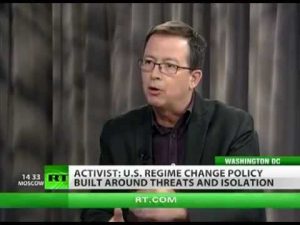

Middle East Round Up: Brian Becker
Iran and Gaza are at both at critical and potentially catastrophic junctures. Iran faces new challenges due to because of Donald Trump’s denunciation of the 2015 nuclear deal with Iran and the re-imposition of sweeping sanctions. As well, recent elections in Iraq pushed Iran’s allies in Iraq’s Shia militias–the Popular Mobilization Forces—into second place by nationalist Moqtada al-Sadr.
The element within the Republican Party with deep pockets is the Republican Jewish Committee. They support Netanyahu and his Likud party. The RJC supported both the blowing up of the Iran deal and the move of the Embassy to Jerusalem. Now they support Netanyahu’s crushing of the Palestinians in Gaza.
Iran also risks being diplomatically out-maneuvered. Israel Prime Minister Benjamin Netanyahu was in Moscow recently, aligning his interests in Syria with Vladimir Putin’s. In what is becoming routine coordination, Israel forewarned Russia of its attacks on Iran. Viewed from Tehran, Russia, Iran’s ostensible brother-in-arms in Syria, is more and more unreliable. Its Saudi foes are greatly encouraged by Trump’s offensive.
Guest – Brian Becker, the National Coordinator of the ANSWER Coalition and a leader of the Party for Socialism and Liberation. Brian has been a central organizer of the mass anti-war demonstrations that have taken place in Washington, D.C. in the past decade.
—-
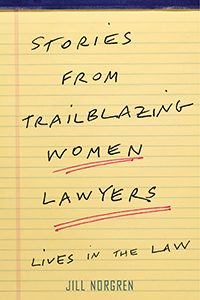
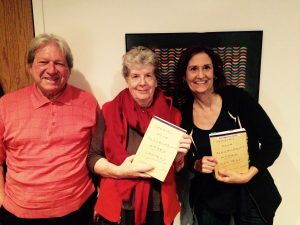
Stories From Trailblazing Women Lawyers
Before the Civil War there were six women lawyers in the entire United States of America. By 1890 there were about 200 and by 1900 about 1000. Women then could not even vote.
It was nearly impossible for a woman to get admitted to a law school or find a job when she graduated. Things did not qualitatively change until the late 1960s and 1970s.
By then, as a consequence of a number of factors including the great civil rights movement, the women’s movement, and the empty law school seats created by drafting men to serve in the Vietnam War, women were able to fight discrimination and win law school admission first by protesting in the streets and then through legislation, court decisions, and the actions of a few forward looking politicians.
Now half of the students in American law schools are women. They are professors in those very same places, indeed, the deans of the two most prestigious law schools in America, Harvard and Yale, are women. They are partners in law firms, hold important positions and governmental agencies, and are judges on the bench.
They have made a difference in the measure of social justice obtained by people in this country by advancing peoples’ and women’s rights in education, healthcare, employment, discrimination, family life, and violence against women.
Guest –Jill Norgren, the author of the just published book Stories From Trailblazing Women Lawyers. Ms. Norgren is Professor Emerita of Political Science at John Jay College and the Graduate Center, the City University of New York. She is the author of several books including Rebels at the Bar.
————————
Civil Liberties, Criminalizing Dissent, Human Rights, Human Trafficking, Supreme Court, Torture, Truth to Power, War Resister
Podcast: Play in new window | Download
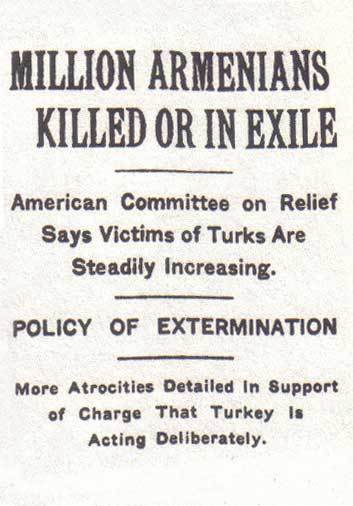
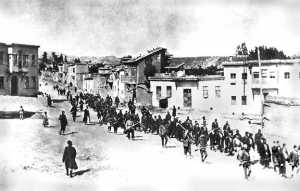
Speaking In Turkish: Denying the Armenian Genocide
Around the world, April 24 marks the observance of the Armenian Genocide. On that day in 1915 the Interior Minister of the Ottoman Empire ordered the arrest and hangings of Armenian intellectuals and community leaders in Constantinople. It was the beginning of a systematic and well-documented plan to eliminate the Armenians, who were Christian, and who had been under Ottoman rule and treated as second class citizens since the 15th century.
The unspeakable and gruesome nature of the killings—beheadings of groups of babies, dismemberments, mass burnings, mass drownings, use of toxic gas, lethal injections of morphine or injections with the blood of typhoid fever patients—render oral histories particularly difficult for survivors of the victims.
Why did this happen? Despite being deemed inferior to Turkish Muslims, the Armenian community had attained a prestigious position in the Ottoman Empire and the central authorities there grew apprehensive of their power and longing for a homeland. The concerted plan of deportation and extermination was effected, in large part, because World War I demanded the involvement and concern of potential allied countries. As the writer Grigoris Balakian wrote, the war provided the Turkish government “their sole opportunity, one unprecedented” to exploit the chaos of war in order to carry out their extermination plan.
As Armenians escaped to several countries, including the United States, a number came to New Britain, Connecticut in 1892 to work in the factories of what was then known as the hardware capital of the world. By 1940 nearly 3,000 Armenians lived there in a tight-knit community.
Pope Frances calls it a duty not to forget “the senseless slaughter” of an estimated one and a half million Armenians by the Ottoman Turks from 1915 to 1923. “Concealing or denying evil is like allowing a wound to keep bleeding without bandaging it,” the Pope said just two weeks before the 100th anniversary of the systematic implementation of a plan to exterminate the Armenian race.
Special thanks to Jennie Garabedian, Arthur Sheverdian, Ruth Swisher, Harry Mazadoorian, and Roxie Maljanian. Produced and written by Heidi Boghosian and Geoff Brady.
———————————————

CIA Sponsored Terror, Civil Liberties, Criminalizing Dissent, Death Penalty, FBI Intrusion, Habeas Corpus, Human Rights, Political Prisoner, Prison Industry, Supreme Court, Surveillance, Torture, Truth to Power
Podcast: Play in new window | Download
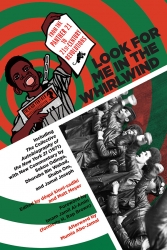
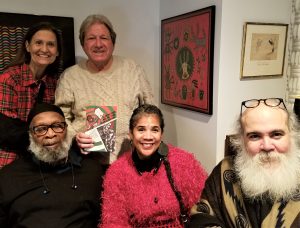
Look for Me in the Whirlwind: From the Panther 21 to 21st-Century Revolutions
The Black Panther Party was formed by community college students in Oakland California in 1966, the year after Malcolm X was murdered in New York City. It’s original name was the Black Panther Party For Self Defense.
The Black Panther Party set an example by its community programs and courage in declaring that it would defend itself against police brutality. The Black Panther Party spread westward from California to New York where chapters were organized in Brooklyn and Harlem, where Malcolm X was from. The Panthers frightened America’s elite. J Edgar Hoover and the FBI set out to destroy them and eventually succeeded. A great courtroom battle took place place in New York City shortly after the establishment of the chapters. Twenty one Black Panthers were framed up on baseless conspiracy charges.
They spent two years in prison including one year on trial. The jury was out for only one hour and acquitted them totally of all the baseless charges. The collective story of the New York City black panthers and their trial is told in the newly re-issued book Look For Me In The Whirlwind. The book is edited by Dequi Kioni-sadiki and Matt Meyer. It has a forward by Imam Jamil Al-Amin (formerly H. Rap Brown), the former head of the Student Nonviolent Coordinating Committee now in prison for life in Georgia and it contains an afterword by Mumia Abu-Jamal.
Guest – Matt Meyer is a New York City–based educator, organizer, and author who serves as War Resisters International Africa Support Network Coordinator, and who represents the International Peace Research Association at the United Nations Economic and Social Council. A former draft registration resister, Meyer’s extensive human rights work has included support for all political prisoners and prisoners of conscience, solidarity with Puerto Rico and the Black Liberation Movement, and board membership on the A.J. Muste Memorial Institute.
Guest – déqui kioni-sadiki is the chair of the Malcolm X Commemoration Committee and was a leader of the Sekou Odinga Defense Committee, which waged a successful campaign for the release of her husband. A tireless coalition-builder and organizer, déqui is a radio producer of the weekly show “Where We Live” on WBAI-Radio, Pacifica; an educator with the NYC Department of Education; and a member of the Jericho Movement to Free All Political Prisoners.
Guest – Sekou Odinga was a member of Malcolm X’s Organization of Afro-American Unity, a founding member of the New York chapter of the Black Panther Party as well as the Black Panther International Section, and was a member of the NY Panther 21. A citizen of the Republic of New Afrika and combatant of the Black Liberation Army, Sekou was captured in October 1981, mercilessly tortured, and spent the following thirty-three years behind bars—a prisoner of war and political prisoner of the U.S. empire. Since his release in November 2014, he has remained a stalwart fighter for justice and for the release of all political prisoners.
—-
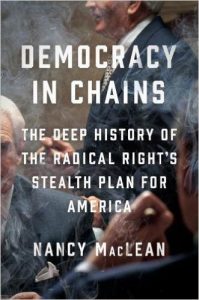
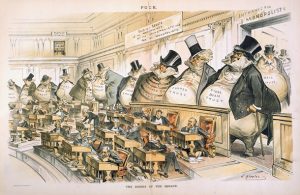
Democracy in Chains: The Deep History of the Radical Right’s Stealth Plan for America
The spectacle of President Donald Trump and the palace intrigue in the White House has served daily to distract people from the political strategy and accomplishments of the radical right, which is taking over the Republican Party.
Over time, the GOP has been transformed into operation conducting a concerted effort to curb democratic rule in favor of capitalist interests in every branch of government, whatever the consequences. It is marching ever closer to the ultimate goal of reshaping the Constitution to protect monied interests. This gradual take over of a major political party happened steadily, over several decades, and often in plain sight.
Duke University Professor Nancy MacLean exposes the architecture of this change and it’s ultimate aim. She has written that “both my research and my observations as a citizen lead me to believe American democracy is in peril”.
Guest – Professor Nancy MacLean, whose new book, Democracy in Chains: The Deep History of the Radical Right’s Stealth Plan for America, has been described by Publishers Weekly as “a thoroughly researched and gripping narrative… [and] a feat of American intellectual and political history.” Booklist called it “perhaps the best explanation to date of the roots of the political divide that threatens to irrevocably alter American government.” The author of four other books, including Freedom is Not Enough: The Opening of the American Workplace (2006) called by the Chicago Tribune “contemporary history at its best,” and Behind the Mask of Chivalry: The Making of the Second Ku Klux Klan,named a New York Times “noteworthy” book of 1994, MacLean is the William H. Chafe Professor of History and Public Policy.
CIA Sponsored Terror, Civil Liberties, Criminalizing Dissent, Habeas Corpus, Human Rights, Military Tribunal, NSA Spying, Political Prisoner, Prison Industry, Prosecution of the Bush Administration, Supreme Court, Surveillance, Targeting Muslims, Truth to Power, War Resister
Podcast: Play in new window | Download


Will the 911 Case Finally Go To Trial?
Sixteen years have passed since the 911 attacks. The truth of who was behind the attacks has come out in a class action lawsuit brought by more than 6500 victims and survivors. The lawsuit alleges that it was elements of the Saudi Arabian government that attacked us on 9/11. The Defendant in the lawsuit is Saudi Arabia.
The Saudi Arabian government hired 15 public relations firms to help them deny responsibility. They hired several Washington white shoe high powered connected law firms. They hid behind the law of sovereign immunity, which had to be overturned by an act of Congress in order for the lawsuit to proceed. They were helped by the US government in the cover-up by the Bush and Obama administrations. But after 16 years the case is now proceeding rapidly through the Federal courts and will either be settled or tried. The object of the lawsuit is to obtain money explained Sharon Pemboli, one of the plaintiffs and leaders of a group of women from New Jersey known as “the Jersey girls” who lobbied to win passage of the law which made the lawsuit possible. She believes that if the Saudi Arabian government is deprived of funds it will not be able to fund Al Qaeda and the extremist Wahhabi clergy responsible for supporting the terrorism of Al Qaeda.
The American public has been led to believe mistakenly that Saddam Hussein and Iraq were behind 911. The attack on Iraq was a war of aggression. At the end of World War II the United States set up the Nuremberg trials to try Nazi war criminals. They wanted to set forth principles that were not merely victor’s justice. At the Nuremberg trials the Germans were found guilty of starting a war of aggression, which was called the greatest of all crimes because it has contained within it all other crimes.
Guest – Andrew Cockburn, the Washington editor of Harper’s magazine. He has written an extremely important article in the October issue titled Crime and Punishment: Will the 9/11 Case Finally Go To Trial? about the class-action law suit brought by the victims of 9/11 against the government of Saudi Arabia.
—-


U.S. Magdalene Laundries and the Indiana Women’s Prison Researchers
From the 18th to early 20th centuries Catholic institutions known as the Magdalene Laundries in Ireland effectively enslaved unmarried mothers, where infants and mothers were subjected to brutal conditions and died in the hundreds. In 1993, a mass grave containing 155 corpses was uncovered in the convent grounds of one of the laundries. This led to media revelations about the operations of the secretive institutions Investigations into these homes have brought apologies and official compensation by the state of Ireland.
Few realize, however, that these homes also existed in the United States. Reports of the inhumane conditions in these homes has encouraged survivors of U.S. Magdalene Laundries to share their own their experiences. Surprisingly, few religious leaders, journalists and historians have yet to address and speak out about this chapter in our history.
That is, until scholars at the Indiana Women’s Prison began to research Magdalene Laundries, and their impact on girls and young women of all faiths across the United States for over 100 years. They believe that these homes were in effect the first prisons for women in the nation. And their work is being published and helping to spark a national discussion.
In a law review article that they published in the Journal of the Indiana Academy of the Social Sciences, the researchers note that their discovery of the laundries and their role in confining women is ‘stark evidence of historical amnesia.They say that the laundries played an important role in shaping attitudes toward female sexuality, identity, and societal reintegration.
Guest – Kelsey Kauffman, in 2012 she and two friends started a small college program at the Indiana Women’s Prison that has grown to 14 teachers and 80 students. She has worked as a prison officer and has taught in three prisons. Her research, which has taken her to more than 80 prisons on four continents, focuses primarily on the impact prison employment has on officers.
——————————————
Civil Liberties, Criminalizing Dissent, Human Rights, NSA Spying, Prison Industry, Supreme Court, Targeting Muslims, Torture, War Resister
Podcast: Play in new window | Download
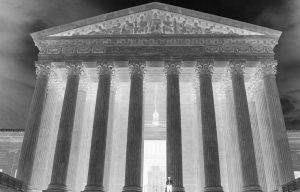

CCR: Current Supreme Court Dockets
We are currently living through an attack on every aspect of American democracy. This phenomena predated the Trump presidency and has been qualitatively accelerated by it.
This across-the-board constriction of the power and rule of the American people, to the extent that it had existed, has encompassed the suppression of voting rights; an attack on public education; the growth of enormous income inequality; the unimpeded influence of money in elections; the threat and constriction of the right of women to control their own bodies; the attack on peoples’ rights to build and join effective unions; the refusal to close the offshore prison of Guantánamo and the refusal to prosecute illegal torturers; the attack and net neutrality and access to the internet; the increase by the state of the surveillance of American citizens; the militarization of the police; encouragement of racism; the banning of Muslims; suppression of the right to demonstrate; and the growth in executive authority.
Guest – Attorney Baher Azmy, the Legal Director of the Center for Constitutional Rights. The CCR was founded in 1966 to advance the goals of the civil rights movement. Michael Ratner, our co-host and founder of Law And Disorder Radio, was its president emeritus at the time of his passing in May of last year.
—-
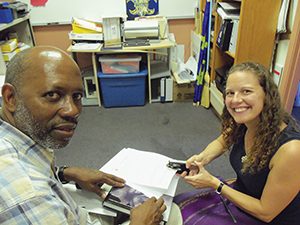

Lawyers You’ll Like: Alison McCrary
As part of our Lawyers You’ll Like series, today we are joined by Alison McCrary. Alison is a social justice attorney, a Catholic nun, president of the Louisiana Chapter of the National Lawyers Guild, and a Spiritual Advisor on Louisiana’s death row. She is the former Program Director for the Community-Police Mediation at the New Orleans Office of the Independent Police Monitor where she created a national model for improving community-police relationships, taught at the New Orleans Police Academy, and helped develop similar programs in cities across the nation.
As a 2010 Soros Justice Advocacy Fellowship in New Orleans, Alison challenged and helped reform policing practices and policies to transform relationships between police officers and the bearers of New Orleans’ indigenous cultural traditions. Alison has served as a National Lawyers Guild legal observer trainer and the New Orleans Legal Observer® Program Coordinator.
Before law school, she worked at the Capital Post-Conviction Project of Louisiana providing litigation support on death penalty cases and at the United Nations in New York monitoring the implementation of U.N. Security Council Resolutions.
Guest – Attorney Alison McCrary. In New Orleans, Alison worked, clerked, and/or volunteered at Southeast Louisiana Legal Services, the Louisiana Voters’ Rights Network, Equity and Inclusion Campaign for the Louisiana Disaster Recovery Foundation, Orleans Parish Public Defenders Office, Louisiana’s Fourth Circuit Court of Appeals, and Loyola University’s Community Justice Clinic. Nationally, Alison coordinates and provides legal support for social justice movements such as the School of the Americas Watch. She received her J.D. from Loyola University’s College of Law in New Orleans and her B.A. in English at Georgia State University in Atlanta.
————————————–
Civil Liberties, Criminalizing Dissent, Human Rights, NSA Spying, Political Prisoner, Prison Industry, RFID, Supreme Court, Surveillance, Truth to Power
Podcast: Play in new window | Download
Law and Disorder Editorials:
- FDA Approves Digital Pill by Heidi Boghosian
—-
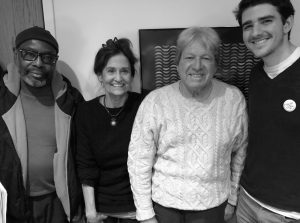
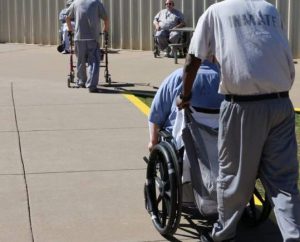
Release Aging People in Prison Campaign
The number of persons 50 years and older in New York State has risen more than 98% since 2000; it now exceeds 10,000—nearly 20% of the total incarcerated population. This reflects a national crisis in the prison system and the extension of a culture of revenge and punishment into all areas of our society.
The organization Release Aging People in Prison, or RAPP, works to end mass incarceration and promote racial justice by getting elderly and infirm people out of prison.
Led by Mujahid Farid, a 2013 Soros Justice Fellow who was incarcerated for 33 years in New York before his release in 2011, RAPP focuses on aging people in prison, many of whom are long-termers convicted of serious crimes. Many of these human beings have transformed their lives and developed skills and abilities they lacked before incarceration. They could be released from prison with little or no threat to public safety. Yet many are denied release, often for political reasons, and they needlessly remain imprisoned into old age. These elders could return to their communities if current mechanisms such as parole and compassionate release were correctly utilized. We also support legislation in New York to correct the parole system and increase the number of releases.
Guest – Mujahid Farid co-founded the Prisoners AIDS Counseling and Education program and helped design prison-based sociology and theology courses that allowed others to earn college-credited in prison. He also earned four college degrees and other certifications while incarcerated, including his paralegal certificate, NYS Department of Labor Certificate in Human Development Counseling, and NYC Department of Health Certificate in HIV/AIDS Counseling.
—-
Guest – David George, Associate Director of RAPP. In the last few years Dave has organized with and on behalf of currently and formerly incarcerated people, including at the Osborne Association and Correctional Association of New York.
—-
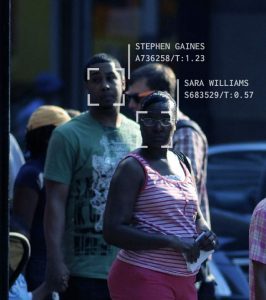

Perpetual Line Up: Unregulated Police Face Recognition In America
The presence of surveillance cameras across the United States has enabled targeted facial recognition surveillance at essentially any place and any time. Each day law enforcement puts in place more and more cameras, including CCTV cameras, police body cameras, and cameras on drones and other aircraft. The FBI’s Next Generation Biometric Identification Database and its facial recognition unit, FACE Services, can search for and identify nearly 64 million Americans, either from its own databases or through access to state DMV databases of driving license photos.
It’s likely that government agencies will soon be able to pinpoint your location and even with whom you’ve been, just by typing your name into a computer.
The release of Apple’s IPhone X has drawn scrutiny to this technology. Despite civil liberties and privacy concerns, there are few limits on facial recognition technology. In March 2017 Congress held a hearing to discuss the risks of facial recognition surveillance. There is concern that facial recognition can be used to get around existing legal protections against location tracking, opening the door to unprecedented government monitoring an logging of personal associations, including protected First Amendment-related activities. Knowledge of individual’s political, religious and associational activities could lead the way to bias, persecution and abuse.
As with many technological advances, there are benefits, too. Facial recognition can assist in locating missing persons or for other public safety purposes.
Guest – Clare Garvie, Clare is a Law Fellow at the Georgetown Law Center on Privacy and Technology. Her research with the Center is on face recognition use by law enforcement and the disparate impact of payday lending on vulnerable communities. She worked on the Center’s 2016 report on facial recognition technology.






















